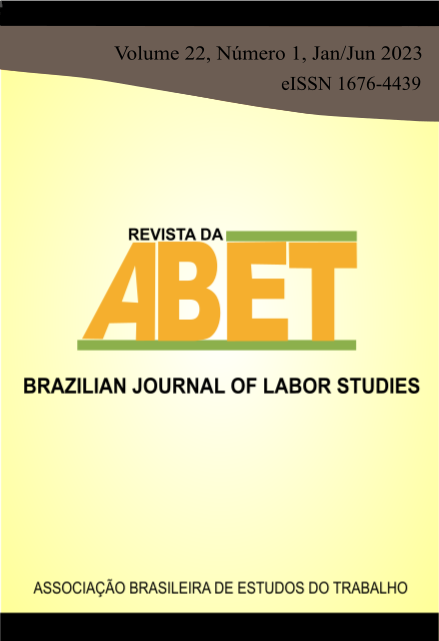DETERMINANTS OF MODERN SLAVERY IN BRAZILIAN MUNICIPALITIES
DOI:
https://doi.org/10.61999/abet.1676-4439.2023v22n1.59062Abstract
Modern slavery in Brazil has been widely approached from a legal point of view, descriptive analysis and with case studies. This paper contributes with an economic analysis of the theme. The purpose of this article is to identify the main determinants of modern slavery in Brazilian cities. To identify these determinants, it was used two econometric models: the probit model and the Heckman sample selection model, using the Labor Ministry and the Atlas of Human Development datasets. The results indicate that low per capita income, low schooling, high inequality and rural population positively affect the number of slaves in cities. Therefore, policies that move towards tackling inequality and low levels of education may contribute to mitigate modern slavery in Brazilian municipalities.
Downloads
Metrics
No metrics found.
Downloads
Published
How to Cite
Issue
Section
License
Copyright (c) 2023 Fernanda Cavalcante Rangel, Ana Carolina da Cruz Lima

This work is licensed under a Creative Commons Attribution-NonCommercial-NoDerivatives 4.0 International License.
Política de Acesso Livre
Esta revista oferece acesso livre imediato ao seu conteúdo, seguindo o princípio de que disponibilizar gratuitamente o conhecimento científico ao público proporciona maior democratização mundial do conhecimento.
Atribuição dos artigos é não comercial (sem derivações 4.0, isto é, Creative Commons) e o acesso é livre e gratuito para download e leitura.
Não há taxa para submissão, avaliação e publicação de artigos.
Copyright
1) Os artigos são de responsabilidade exclusiva dos autores. É permitida sua reprodução, total ou parcial desde que seja citada a fonte.
2) Os trabalhos enviados para publicação devem ser inéditos, não sendo permitida sua apresentação simultânea em outro periódico nacional.
3) Os artigos são submetidos a pareceristas "ad hoc", após prévia avaliação da Comissão Editorial, os quais podem aceitar, recusar ou reapresentar o original ao autor com sugestões para alterações. Os nomes dos pareceristas permanecem em sigilo, bem como os nomes dos autores.
Os Autores que publicam nesta revista concordam com os seguintes termos:
Autores mantêm os direitos autorais e concedem à revista o direito de primeira publicação, com o trabalho simultaneamente licenciado sob a Creative Commons Attribution License, permitindo o compartilhamento do trabalho com reconhecimento da autoria do trabalho e publicação inicial nesta revista.
Autores têm autorização para assumir contratos adicionais separadamente, para distribuição não-exclusiva da versão do trabalho publicada nesta revista (ex.: publicar em repositório institucional ou como capítulo de livro), com reconhecimento de autoria e publicação inicial nesta revista.
Autores têm permissão e são estimulados a publicar e distribuir seu trabalho online (ex.: em repositórios institucionais ou na sua página pessoal), já que isso pode gerar alterações produtivas, bem como aumentar o impacto e a citação do trabalho publicado.
Patrocinador
A publicação recebe financiamento da Associação Brasileira de Estudos do Trabalho.










